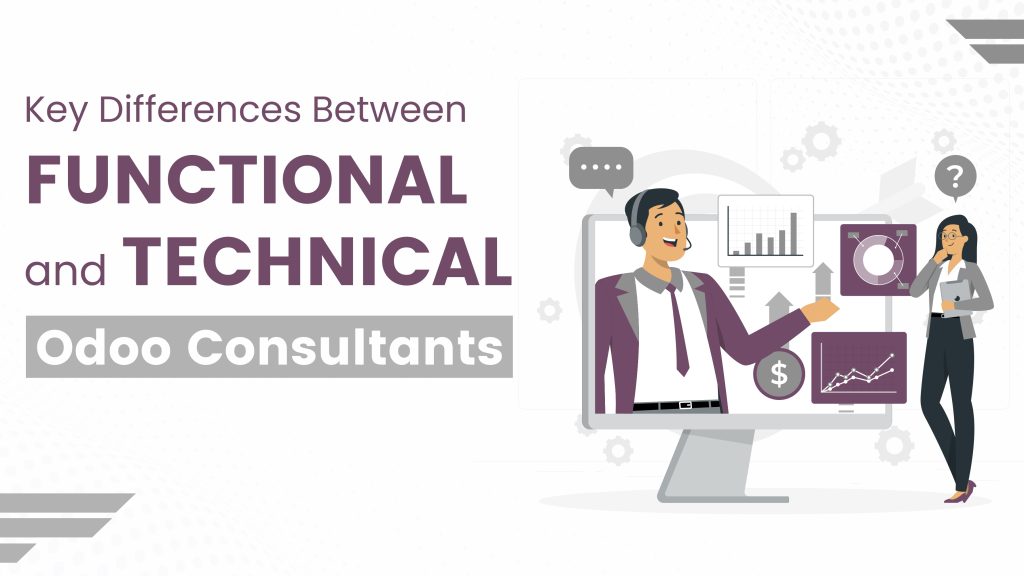
Implementing Odoo, a versatile and comprehensive ERP platform, often requires the expertise of consultants to ensure the system aligns perfectly with your business needs. These consultants typically fall into two categories: functional and technical. While both play critical roles in a successful Odoo implementation, their responsibilities, expertise, and contributions differ significantly.
Understanding these differences can help businesses decide which type of consultant they need or how to balance both for an effective ERP implementation. This blog explores the key distinctions between functional and technical Odoo consultants, shedding light on their roles, skills, and how they complement each other in the Odoo ecosystem.
Who Is a Functional Odoo Consultant?
A functional Odoo consultant specializes in understanding business processes and configuring Odoo modules to meet organizational needs. Their primary focus is on aligning Odoo’s capabilities with the client’s operational requirements without extensive coding or technical modifications.
Key Responsibilities:
- Requirement Analysis: Work closely with stakeholders to understand their business processes and gather detailed requirements.
- Module Configuration: Set up and configure Odoo modules such as Sales, Inventory, HR, or Accounting based on the client’s needs.
- Process Optimization: Suggest improvements to business workflows using Odoo’s standard features.
- Training and Support: Provide training to end-users and ensure smooth adoption of the system.
- Testing: Validate configurations and workflows to ensure they function as expected.
Skills and Expertise:
- Business Acumen: A deep understanding of various industries and their specific workflows.
- Odoo Module Knowledge: Familiarity with Odoo’s out-of-the-box functionalities across multiple modules.
- Communication Skills: The ability to bridge the gap between technical teams and business users.
Functional consultants are often the first point of contact for businesses and play a crucial role in translating business needs into actionable configurations within Odoo.
Who Is a Technical Odoo Consultant?
A technical Odoo consultant focuses on the development and customization of the Odoo platform. They handle the backend aspects of the implementation, ensuring the system is tailored to meet complex or unique business requirements.
Key Responsibilities:
- Customization: Develop custom modules or modify existing ones to address specific business needs.
- Integration: Connect Odoo with third-party applications, APIs, or legacy systems.
- Technical Support: Troubleshoot and resolve technical issues within the system.
- Performance Optimization: Improve the performance and scalability of the Odoo implementation.
- Data Migration: Assist in migrating data from legacy systems to Odoo, ensuring accuracy and completeness.
Skills and Expertise:
- Programming Skills: Proficiency in Python (Odoo’s primary programming language) and frameworks like XML and JavaScript.
- Database Management: Expertise in managing Odoo’s PostgreSQL database.
- Problem-Solving: The ability to develop technical solutions for complex business challenges.
Technical consultants work behind the scenes to ensure Odoo functions as intended, even in scenarios where standard configurations are insufficient.
Key Differences Between Functional and Technical Odoo Consultants
A. Focus Areas
- Functional Consultant: Concentrates on understanding and optimizing business processes using Odoo’s standard features.
- Technical Consultant: Focuses on the technical backend, including coding, customization, and integrations.
B. Approach to Problem-Solving
- Functional Consultant: Resolves issues by configuring existing modules and using built-in functionalities.
- Technical Consultant: Develops custom solutions or modifies the system to address unique challenges.
C. Skillsets
- Functional Consultant: Requires strong knowledge of business processes, Odoo modules, and communication skills.
- Technical Consultant: Needs expertise in programming, database management, and technical troubleshooting.
D. User Interaction
- Functional Consultant: Works closely with end-users and stakeholders to understand requirements and provide training.
- Technical Consultant: Collaborates more with the functional team and technical stakeholders rather than directly with end-users.
E. Nature of Work
- Functional Consultant: Primarily focuses on configurations, user adoption, and process improvement.
- Technical Consultant: Handles development, system customization, and integrations.
How Functional and Technical Consultants Complement Each Other
Although functional and technical consultants have distinct roles, their collaboration is essential for a successful Odoo implementation. Functional consultants identify business needs and translate them into functional requirements, which are then passed on to technical consultants for development or customization.
Example Scenario:
- A company requires a custom sales workflow not available in Odoo’s standard modules.
- Functional Consultant: Analyzes the workflow, gathers requirements, and explains the business logic.
- Technical Consultant: Develops a custom module or modifies existing code to implement the workflow.
This synergy ensures that the Odoo implementation meets the business’s unique needs while maintaining technical integrity.
| When to Hire a Functional Consultant | When to Hire a Technical Consultant |
| Consider hiring a functional consultant if: | Hire a technical consultant if: |
| 1. You need to implement standard Odoo modules: They can configure and optimize out-of-the-box functionalities without requiring custom development. 2. You’re focused on process improvement: They can identify inefficiencies in your workflows and suggest ways to improve them using Odoo. 3. You require user training: They can train your team to use Odoo effectively and ensure user adoption. | 1. Your business requires customizations: They can develop solutions tailored to your specific needs. 2. You need integrations: They can connect Odoo with third-party tools or legacy systems. 3. You face technical challenges: They can troubleshoot complex issues and optimize system performance. |
Conclusion
The success of your Odoo implementation hinges on understanding the distinct roles of functional and technical consultants. While functional consultants bring business knowledge and configuration expertise, technical consultants provide the coding and development skills needed for advanced customization.
By leveraging the strengths of both, businesses can ensure a smooth, efficient, and customized Odoo implementation tailored to their needs. Whether you’re looking for process optimization, user training, or custom solutions, finding the right balance between functional and technical expertise is the key to unlocking Odoo’s full potential.
Looking for expert guidance on your Odoo implementation? Contact us today to connect with skilled functional and technical consultants who can bring your ERP vision to life!

